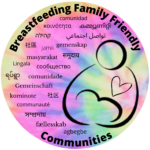Breastfeeding Family Friendly Communities experience with technical assistance and capacity building as it relates to advocacy, community engagement, and health equity.
The Breastfeeding Family Friendly Communities (BFFC) initiative advocates for a world where communities make a commitment to equitable policies and practices to protect and promote the rights of all breastfeeding, chestfeeding, and human milk feeding families and to support all families to meet their infant feeding goals. Our experience with technical assistance and capacity building is shaped by the requests and needs of each community/municipality. Communities receive customized education, training, technical support, capacity building, and tools and resources that help advance their goals around creating a supportive community as a key component of advancing First Food Race Equity. Since 2014, BFFC has fostered the creation of community-led breastfeeding friendly initiatives that increase awareness of the whole community’s role in supporting families, eliminating disparities, and implementing specific strategies to create a welcoming environment inclusive of all. We do this through the Ten Steps model, which promotes policy, system-level, and environmental changes to build continuity of care and community engagement using an ecological model of community impact on the family. Equity surrounds all that we do.
The foundation of our technical assistance and capacity building is the Ten Steps, which includes Suggested Approaches and Measures. While we advocate for the initiative widely, an invitation from a community is key, because this initiative is successful only through strong grassroots support. We walk the community-based organizations and groups through the Breastfeeding Family Friendly Communities highly-effective tools, practices, and approaches starting with an overview of the Ten Steps, then the Measures and Suggested Approaches, then writing their first meeting agenda, and then how to connect with the community, that is, how to encourage diverse community members to become involved. We support the community-based group by reviewing together the Ten Steps and developing a one-year strategic plan typically centered around a proclamation because municipal buy-in opens doors to all the other community services (e.g., health department, WIC, chamber of commerce). All information is available on the Breastfeeding Communities website; however, we have learned that communities need more. We celebrate their progress and their successes, and assist them with overcoming challenges in a sustainable way. Research has shown that optimal infant feeding supports infant and early childhood health, growth and development, and lowers risk of childhood obesity. Beyond these focus areas, breastfeeding, chestfeeding, and human milk feeding improves maternal health and mental well-being, results in health care cost savings, and offers environmental and societal benefits.
Services BFFC provides.
Breastfeeding Family Friendly Communities provides local groups with technical assistance over the course of 2-5 years.
Rate
If your group is entirely made up of parents and members of nonprofits, we are willing to meet with a community group for 3 to 5 hours for free.
If your group is composed primarily of representatives from health departments and/or health service institutions, we typically charge $85 per hour depending on the financial capacity of the organization.
The types of services our communities receive are:
- Innovative strategies and approaches to build a more supportive community as an integral part of the First Food Equity movement;
- Self-appraisal tools and other measures to track progress and other electronic resources and materials to build awareness and a broad stakeholder base for community engagement;
- Technical assistance regarding tools, advocacy engagement, and building impactful digital web and social media presences;
- Capacity building via collective impact trainings to ensure marginalized voices are elevated and all see breastfeeding, chestfeeding, and human milk feeding as an integral part of the reproductive justice framework;
- Educational presentations to build awareness about the importance of a supportive community environment for First Food Equity and health equity, including all birthing and lactating people inclusive of all gender and sexual identities;
- Event organization assistance and language translation of event promotional materials based on the needs of the local community.
- Host a networking hub for our communities to learn from one another and share successes and other stories of encouragement and inspiration;
- Co-design materials with communities and print community resources;
- Provide child care curriculum bundles to communitie to distribute to early childhood providers in their communities.
The types of services we hope to provide to our communities with more funding:
- Expand website development, hosting, and maintenance of local BFCC websites.
